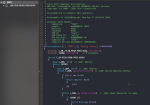- Joined
- May 3, 2020
- Messages
- 93
Hello everyone! After reading many of the great success stories here at AMD OS X I started to see a repeating pattern plaguing essentially all of us. No, not USB and sleep (some day!) rather poor OpenCL and Metal performance, especially with Catalina. Well, I think I have found an answer and possible solution. Following the thread over at TonymacX86 (here) it was discovered that Apple has (yet again) pulled some Tom-Foolery on the the way things are done in Mac OS. After some testing on my old (now sold) i7 3770K system with my Gigabyte RX Vega 64 OC Gaming I determined that the SSDT fix does indeed work! The only issue is we all are on AMD and changes have to be made due to the PCI address that differ on Intel boards. After my posts were deleted in the original thread after it was obvious I needed help on a non-Intel system (f-ing hypocrites) I decided to take matters into my own hand and bring the topic here. This is where I need the POWER OF THE COMMUNITY to pull together and make this a reality! I suggest one head over to the link above and get familiar with the insanest and outs of the process.
Here is my thinking. The TL;DR of it is that the PCI address as appears in I/O Reg under GFX needs to be properly patched into the SSDT.

Take note of the path: IOService:/AppleACPIPlatformExpert/PCI0@0/AppleACPIPCI/GPP8@3,1/IOPP/pci-bridge@0/IOPP/pci-bridge@0/IOPP/GFX0@0
Now look at the snippet from the SSDT for Vega 64:

See what I am thinking? What I need help is for someone who is more experienced than I at editing SSDT; It's been 8 years since I had to manually edit a DSDT and I am rusty and am not sure what is needed to edit into the path in the SSDT. Schiit, I am not ever sure if my line of thinking is correct! What is great if we can get this working is the fact that we will no longer need Whatevergreen to inject a generic frame buffer and instead have the ability to inject our own (if desired because what's in the specific SSDTs are the optimum frame buffers).
@Shaneee, I am unsure if this is the right place to post this thread and feel free to move it if you feel it would be better elsewhere. Regardless, we need to get this rolling! I have attached the files from the TMX86 thread. Please note that as they are now they won't do a darn thing! We can do this team!
Here is my thinking. The TL;DR of it is that the PCI address as appears in I/O Reg under GFX needs to be properly patched into the SSDT.

Take note of the path: IOService:/AppleACPIPlatformExpert/PCI0@0/AppleACPIPCI/GPP8@3,1/IOPP/pci-bridge@0/IOPP/pci-bridge@0/IOPP/GFX0@0
Now look at the snippet from the SSDT for Vega 64:

See what I am thinking? What I need help is for someone who is more experienced than I at editing SSDT; It's been 8 years since I had to manually edit a DSDT and I am rusty and am not sure what is needed to edit into the path in the SSDT. Schiit, I am not ever sure if my line of thinking is correct! What is great if we can get this working is the fact that we will no longer need Whatevergreen to inject a generic frame buffer and instead have the ability to inject our own (if desired because what's in the specific SSDTs are the optimum frame buffers).
@Shaneee, I am unsure if this is the right place to post this thread and feel free to move it if you feel it would be better elsewhere. Regardless, we need to get this rolling! I have attached the files from the TMX86 thread. Please note that as they are now they won't do a darn thing! We can do this team!
